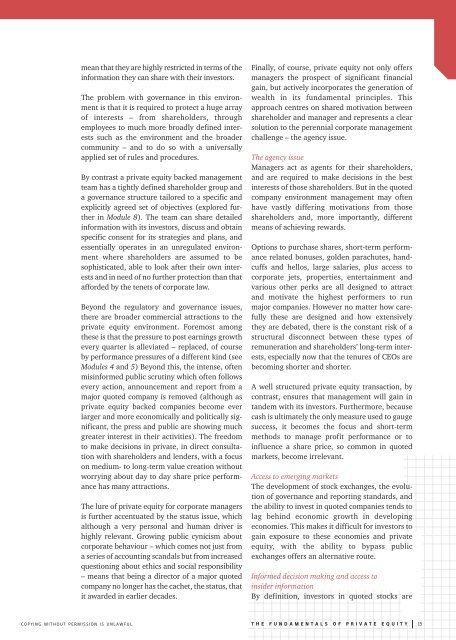Fundamentals of Private Equity and Venture Capital - PEI Media
Fundamentals of Private Equity and Venture Capital - PEI Media
Fundamentals of Private Equity and Venture Capital - PEI Media
Create successful ePaper yourself
Turn your PDF publications into a flip-book with our unique Google optimized e-Paper software.
mean that they are highly restricted in terms <strong>of</strong> the<br />
information they can share with their investors.<br />
The problem with governance in this environment<br />
is that it is required to protect a huge array<br />
<strong>of</strong> interests – from shareholders, through<br />
employees to much more broadly defined interests<br />
such as the environment <strong>and</strong> the broader<br />
community – <strong>and</strong> to do so with a universally<br />
applied set <strong>of</strong> rules <strong>and</strong> procedures.<br />
By contrast a private equity backed management<br />
team has a tightly defined shareholder group <strong>and</strong><br />
a governance structure tailored to a specific <strong>and</strong><br />
explicitly agreed set <strong>of</strong> objectives (explored further<br />
in Module 8). The team can share detailed<br />
information with its investors, discuss <strong>and</strong> obtain<br />
specific consent for its strategies <strong>and</strong> plans, <strong>and</strong><br />
essentially operates in an unregulated environment<br />
where shareholders are assumed to be<br />
sophisticated, able to look after their own interests<br />
<strong>and</strong> in need <strong>of</strong> no further protection than that<br />
afforded by the tenets <strong>of</strong> corporate law.<br />
Beyond the regulatory <strong>and</strong> governance issues,<br />
there are broader commercial attractions to the<br />
private equity environment. Foremost among<br />
these is that the pressure to post earnings growth<br />
every quarter is alleviated – replaced, <strong>of</strong> course<br />
by performance pressures <strong>of</strong> a different kind (see<br />
Modules 4 <strong>and</strong> 5) Beyond this, the intense, <strong>of</strong>ten<br />
misinformed public scrutiny which <strong>of</strong>ten follows<br />
every action, announcement <strong>and</strong> report from a<br />
major quoted company is removed (although as<br />
private equity backed companies become ever<br />
larger <strong>and</strong> more economically <strong>and</strong> politically significant,<br />
the press <strong>and</strong> public are showing much<br />
greater interest in their activities). The freedom<br />
to make decisions in private, in direct consultation<br />
with shareholders <strong>and</strong> lenders, with a focus<br />
on medium- to long-term value creation without<br />
worrying about day to day share price performance<br />
has many attractions.<br />
The lure <strong>of</strong> private equity for corporate managers<br />
is further accentuated by the status issue, which<br />
although a very personal <strong>and</strong> human driver is<br />
highly relevant. Growing public cynicism about<br />
corporate behaviour – which comes not just from<br />
a series <strong>of</strong> accounting sc<strong>and</strong>als but from increased<br />
questioning about ethics <strong>and</strong> social responsibility<br />
– means that being a director <strong>of</strong> a major quoted<br />
company no longer has the cachet, the status, that<br />
it awarded in earlier decades.<br />
Finally, <strong>of</strong> course, private equity not only <strong>of</strong>fers<br />
managers the prospect <strong>of</strong> significant financial<br />
gain, but actively incorporates the generation <strong>of</strong><br />
wealth in its fundamental principles. This<br />
approach centres on shared motivation between<br />
shareholder <strong>and</strong> manager <strong>and</strong> represents a clear<br />
solution to the perennial corporate management<br />
challenge – the agency issue.<br />
The agency issue<br />
Managers act as agents for their shareholders,<br />
<strong>and</strong> are required to make decisions in the best<br />
interests <strong>of</strong> those shareholders. But in the quoted<br />
company environment management may <strong>of</strong>ten<br />
have vastly differing motivations from those<br />
shareholders <strong>and</strong>, more importantly, different<br />
means <strong>of</strong> achieving rewards.<br />
Options to purchase shares, short-term performance<br />
related bonuses, golden parachutes, h<strong>and</strong>cuffs<br />
<strong>and</strong> hellos, large salaries, plus access to<br />
corporate jets, properties, entertainment <strong>and</strong><br />
various other perks are all designed to attract<br />
<strong>and</strong> motivate the highest performers to run<br />
major companies. However no matter how carefully<br />
these are designed <strong>and</strong> how extensively<br />
they are debated, there is the constant risk <strong>of</strong> a<br />
structural disconnect between these types <strong>of</strong><br />
remuneration <strong>and</strong> shareholders’ long-term interests,<br />
especially now that the tenures <strong>of</strong> CEOs are<br />
becoming shorter <strong>and</strong> shorter.<br />
A well structured private equity transaction, by<br />
contrast, ensures that management will gain in<br />
t<strong>and</strong>em with its investors. Furthermore, because<br />
cash is ultimately the only measure used to gauge<br />
success, it becomes the focus <strong>and</strong> short-term<br />
methods to manage pr<strong>of</strong>it performance or to<br />
influence a share price, so common in quoted<br />
markets, become irrelevant.<br />
Access to emerging markets<br />
The development <strong>of</strong> stock exchanges, the evolution<br />
<strong>of</strong> governance <strong>and</strong> reporting st<strong>and</strong>ards, <strong>and</strong><br />
the ability to invest in quoted companies tends to<br />
lag behind economic growth in developing<br />
economies. This makes it difficult for investors to<br />
gain exposure to these economies <strong>and</strong> private<br />
equity, with the ability to bypass public<br />
exchanges <strong>of</strong>fers an alternative route.<br />
Informed decision making <strong>and</strong> access to<br />
insider information<br />
By definition, investors in quoted stocks are<br />
COPYING WITHOUT PERMISSION IS UNLAWFUL<br />
THE FUNDAMENTALS OF PRIVATE EQUITY 15

















